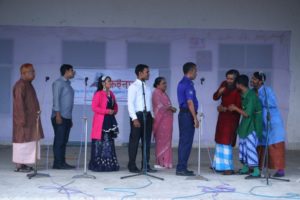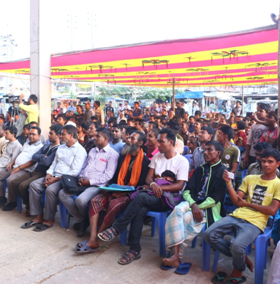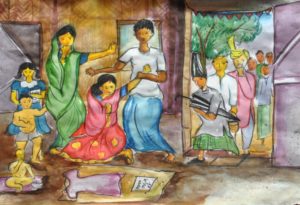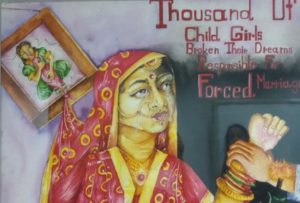15th June 2016 Dhaka, Bangladesh
Forced marriage outreach: A good news story from Bangladesh
It was a hot summer’s day; the temperature was surely pushing 35 °C. My colleague and I reached a village nearly 200 kilometers away from Dhaka where we had come to visit a 17 year old British girl. We were sitting in small dark room, with no windows and a ceiling fan which was doing nothing but recirculating the trapped warm air. The girl had called us secretly from a cousin’s phone and had been able to speak only for a few minutes. With the little information she was able to give to us, we had made our way to this village to check on the girl’s welfare. I could see the fear and agony in her eyes, she was afraid that we might leave her and return to Dhaka. She clasped my hand so tightly; she looked into my eyes and said “Please don’t leave me here, take me with you”. My colleague and I looked at each other and we instantly knew what we must do. There wasn’t a moment to waste. The young girl’s family was putting a huge amount of pressure on her to marry her cousin. Their motive was, to safeguard their vast property and land in their ancestral village.
You might be wondering what happened to this young girl? Yes, we did manage to stop this wedding and this is not the only young girl we have rescued from this kind of situation in the past few years; stories of many more men, women, boys and girls remain untold.
Forced marriage is not an isolated incident. In fact it is quite common in many parts of the world including Bangladesh and we have been working very closely with the Forced Marriage Unit (FMU) in London to address the issue and take all necessary actions. The positive news is, the continuous awareness raising and outreach activities that we have been doing in Bangladesh has helped reduce the number of British people forced into marriage in the country.
I am a very proud member of the Bangladesh consular team and we work together every day to support vulnerable British people at risk. One of our priorities is to support those who are at risk of forced marriage and also those who have already been forced into marriage.
It hasn’t been any easy ride though; the consular team in Bangladesh has been working relentlessly over the last few years to tackle the problem. We have taken several initiatives at the grass roots level to address and mitigate the problem. The results have been extremely promising.
Most of the Bangladeshi Brits who are also known as “Londonis’” have family homes in rural and remote parts of Bangladesh. Some of the areas are so remote that using roads and transport is a huge challenge. Many villages are still yet to get electricity at their homes and those with connections suffer from regular power cuts and load shedding.
It is a great challenge to reach out to these people using the traditional media platforms. Strict religious practices also brings in some restrictions. Literacy rates are very low making it difficult to communicate through campaigns using press and media and television is still considered as taboo in many places. Internet coverage is rare and people need to travel to the nearest township to access email and internet. Mobile internet connections are increasing, but the cost limits the number of users and the service in the villages is still not that satisfactory.
So we’ve gone back to basics and reached out to the the community to encourage them to spread the message. Some of the outreach work we have been doing in Bangladesh includes theatre productions, painting & poster competitions and social discussions.
In rural areas in Bangladesh open air stage productions and street shows are very popular amongst the villagers. It is still a key source of entertainment for the majority population. So we’ve worked with a local theatre group to produce a street play to raise the issue. We chose a prominent screen writer to create the drama in the local Sylheti dialect. In this drama we were able to raise the adverse effects of forced marriage in a very simple but effective way.

The plot of the drama evolved around the father of a Londoni bride who travelled to Bangladesh with a secret ploy to marry his daughter off to a local man, who held influence and power with in the community. The actors of the play were able to convey our messages about the adverse effects of forced marriage and also effectively communicate the British High Commission’s role in tackling the problem.
We staged this show in different areas in Sylhet -a division situated in the North-East part of Bangladesh which has had historic links with the British Bangladeshi population for many decades.  We invited the community leaders, teachers, religious preachers, local police, journalists, lawyers and people from various back grounds within the community to enjoy the shows. The shows were filled by the spontaneous presence of hundreds of villagers. Afterwards we would hold open discussions with members from the community, including the community leaders.
We invited the community leaders, teachers, religious preachers, local police, journalists, lawyers and people from various back grounds within the community to enjoy the shows. The shows were filled by the spontaneous presence of hundreds of villagers. Afterwards we would hold open discussions with members from the community, including the community leaders.
Through this road show, we have managed to create a wide network of partners and stakeholders who are convinced about the adverse effects of forced marriage and who now believe in our cause and are willing to work with us to deter and eliminate forced marriage practices, not only in the British Bangladeshi Community but also for the people of Bangladesh.
Another very different and innovative step is raising forced marriage awareness amongst young children – through a painting and art competition. We invited children between 11- 16 years to participate in an art competition on the themes “Your Choice Your Marriage” and “Raise your voice, combat force marriages”.
 We saw this young generation in action using their imagination and creativity. The extraordinary strong messaging that came out from the strokes of the paint brushes of these young people was absolutely phenomenal. We also held a nationwide poster and slogan competition for university students with exhibitions to showcase their work. From this we created campaign materials using the winning entries and a desk calendar that we produced which helped us to continue our messaging and campaign work throughout the year. We have also been using UK diaspora TV channels to communicate the news of our campaigns within the UK communities.
We saw this young generation in action using their imagination and creativity. The extraordinary strong messaging that came out from the strokes of the paint brushes of these young people was absolutely phenomenal. We also held a nationwide poster and slogan competition for university students with exhibitions to showcase their work. From this we created campaign materials using the winning entries and a desk calendar that we produced which helped us to continue our messaging and campaign work throughout the year. We have also been using UK diaspora TV channels to communicate the news of our campaigns within the UK communities.
Let’s hope these campaigns will have a more sustainable impact for these young people. and they carry our message of “choice”, “will” and “rights” for the next generation.
 We are already starting to see the results as many British females and British males have been in touch with us for consular assistance and support after being held hostage to a hostile situation, resulting from the pressure of forced marriage.
We are already starting to see the results as many British females and British males have been in touch with us for consular assistance and support after being held hostage to a hostile situation, resulting from the pressure of forced marriage.
These are all good news stories, but our journey does not end here. We are committed to continue our campaign work to spread the message even further, until we can completely bring a stop to this abhorrent practice. Our holistic approach and combined efforts to create partners and stakeholders within different segments of the community is a big step towards a mass communication campaign to eliminate force marriage practices within the British Bangladeshi Community in the UK and Bangladesh.
My friend whos is a male bangladeshi he forced to go to bangladesh by his girlfriend’s family and was forced to marry her cousin sister (mums sister’s daughter) her mum’s sisters sons called my friend in the uk and said if he didnt go back home and marry the girl then there going to hurt and murder his girlfriend her mum and sister also if he mentioned it to them about the call they made then they will hurt her and her family there… so he went to bangladesh to marry her cousin also they put down on the wedding argreement that he will pay her 10 lak taka uk 10,000pound as her kabin (not sure what its called in english) within a week of the marriage he girlfriend started arguing with her family after finding out what happened and also their marriage was not consummated now they are back in london the bride and her brothers want my friend to pay her 10,000 pound or they will not allow him to get a divorce and they will file a case against him his family are not aware of all this as they will disown if they found out that he went bangladesh and he did not inform them about all this … also he needs to divorce the other girl in order to get married to his girlfriend but the other girls family are saying unless he gives the money they will not give him the marriage certificate for him to give the divorce and also the bangladeshi law is strict now and they will only listen to the girl and not my friend. If there anything that can be done from the UK and my friend is unable to go bangladesh and sort this out without his family from finding out ?? Please help us as i an very worried about him his lost both his parents few years back and that is why his girlfriends family forced him to do this. He had been with his girlfriend for 4 years and she’s also going through depression there has been serval times where she tired to kill herself as she cant take the stress and but she also doesnt want to lose the love of her life
Excellent blog.
Excellent blog Hasina and congratulations on the excellent work around forced marriage by using such innovative ways to deliver the messages.